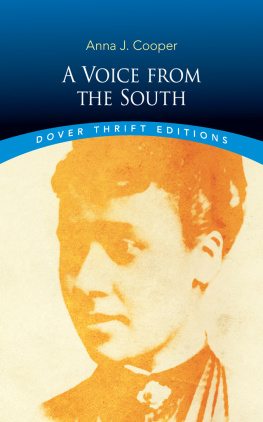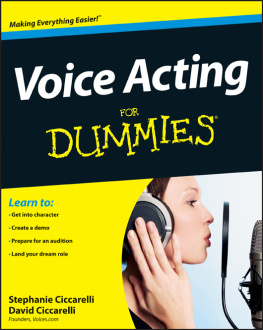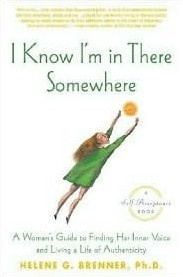C hange Y our V oice, C hange Y our L ife . Copyright 1984 by Morton Cooper, Ph.D. All rights reserved. Printed in the United States of America. No part of this book may be used or reproduced in any manner whatsoever without written permission, except in the case of brief quotations embodied in critical articles and reviews. For information, please visit www.voice-doctor.com
Previous Hardcover Edition published by Macmillan Publishing Co. 1984
First Harper Perennial edition published 1985.
Voice and Speech Company of America, 17th printing, 1999.
Self-Published, 2016.
Library of Congress Cataloging in Publication Data
Cooper, Morton, 1931
Change you voice, change your life.
(Everyday handbook)
Reprint. Originally published: New York: Macmillan, 1984.
1.Voice Culture. I. Title
PN4162.C65 1985 808.5 84-48589
Original ISBN 0-87980-441-6 (pbk)
To my mother, Mae, who encouraged me to be everything I could be. To my wife, Marcia, and daughters, Lorna and Marla, who let me. And to my father, Louis, who died when I was eight; for the legacy of love and kindness he gave me.
Contents
Acknowledgements
Chapter 1 : The Secret of Success
Chapter 2 : The Voice You Love Could Be Your Own
Chapter 3: Reality Training
Chapter 4: Destroying the Myths
Chapter 5: Why Suicide?
Chapter 6: Special Problems
Chapter 7: Dont Fight Success
Chapter 8: Charting Your Course
Acknowledgments
While it has long been my ambition to write a book for the general public on the benefits of healthy voice usage and effective voice sound, this dream could only have been realized with the support and guidance of many individuals to whom I shall be forever grateful. Unfortunately, space limitations preclude my mentioning them all. There are a special few, however, whom I would like to formally acknowledge for their part in bringing this book to fruition.
My wife, Marcia Ann Hartung Cooper, deserves first mention; both for her loving personal encouragement, and her significant professional contribution to my work.
Kathy Robbins demonstrated remarkable agenting skills in finding a home for a thesis on an unheard-of subject. In addition, she provided focus and invaluable structuring suggestions in the developmental stages of writing.
Hillel Black, publisher of Macmillan Publishing Company, allowed my dream to become a reality by inviting me to proceed with my efforts to educate readers on this critical subject. I am deeply indebted to him for his commitment to this endeavor, and also for his kind and expert words of advice. Associate editor Dominick Anfuso lent polish and grace to the final draft.
But the writing of this book could not have been accomplished without the assistance of Leslie Bart, who gave a literary voice to both my practical voice and my methods of treatment.
A heartfelt thanks also to the many laryngologists and medical doctors who have recognized the value of my therapy as well as the importance of healthy voice techniques. Though I cannot mention all who have endorsed my finding, I take this opportunity to express my appreciation to Henry J. Rubin, M.D., associate professor of the Department of Head and Neck Surgery at the UCLA School of Medicine, and the late Joel J. Pressman, M.D., former Chairman of the Head and Neck Division at the UCLA Medical Center.
Professional colleagues to whom I am long-indebted for their help and support are: Virgil Anderson, Ph.D., former Director of the Speech Pathology Division at Stanford University, and Elise Hahn, Ph.D., former Director of the Speech Pathology Division at UCLA.
And the more recent support of the Mayo Clinic and other esteemed medical institutions is also manifestly appreciated.
I thank Andrea Burke for her secretarial assistance in the formulation of this book; and my brother, Everett Cooper, for his trust and confidence in me.
Lastly and most importantly, I would like to express my deepest gratitude to my patients who have permitted me to tell their personal stories. Though their names (and in most cases their occupations and hometowns) have been altered to protect their privacy, their problems and experiences most graphically illustrate the need for greater public awareness on the correct use of the speaking voice. The public figures and celebrities who have generously allowed me to use their real names in reference to their therapy are owed a particular debt. Their place in society presents them as role models and so their examples are enormously helpful in reaching the public with my important message.
PART ONE
Success and Sound
C HAPTER 1
The Secret of Success
The Magic
Some people have the magic. They are seductive but not weak. They are controlling but not aggressive. They are filled, quite simply, with an intangible power that commands attention and generates success.
Franklin Delano Roosevelt, thirty-second president of the United Sates, had the magic. So did Sir Winston Churchill, British prime minister from 1940 to 1945. Each was possessed of that rare ability to convince others of his way of seeing the world; his way of saving the world.
Today, Roosevelt is remembered by AmericansDemocrats and Republicans alikeas a leader of unprecedented magnetism. Churchill remains Great Britains most esteemed statesman. The preeminence of each man is intact, decades after he made his mark on the world.
There is, of course, a lesson to be learned from the successes of these leaders. There is an example to be drawn from them. And that is to identify the source of the intangible power that advances people such as Roosevelt and Churchill above and beyond others with the similar aspirations and potentially equal talents. And the logical next step is to tap into their magic, the magic that gave them the edge on greatness.
That is the purpose of this book: To demonstrate that the one trait shared by almost all who achieve greatness is the power of communication, and to show you how to acquire that power and incorporate it into your own life.
You may be surprised to discover that successful communication depends largely on effective use of the voice. What may surprise you even more is that, with a little bit of self-awareness and the application of practical principles, a magical voice of success can be yours.
I am referring here to what I call a right voice. One that is well produced and natural and healthy. Such a voice is a valuable asset. It can have, quite literally, a hypnotic and powerful hold on your listeners.
By contrast, an inefficient and unpleasant or misplaced sound has a detrimental effect. A voice imbued with negative symptoms or traits will hurt rather than help. It will inhibit rather than enhance. It is a wrong voice.
There are exceptions to this rule, as youll see later in this chapter. But while some people have managed to turn deficient or improperly produced voices to advantage, there is one law that holds fast: The manner in which you express yourself is the key to your identity.
If you doubt this simple truth, consider the extent to which you judge others by their vocal presentation.
Reflect, if you will, on the people who have made lifes most lasting impressions on you, good and bad. A teacher, perhaps. A parent. An authority. A colleague. A competitor. Any role model from any epoch of your life.
Do you remember their attire? Their posture? The color of their eyes? The shape of their ears? The style of their hair? Its strange how those visual perceptions fade over time, but they do. In most instances, what remains is a voice image.










